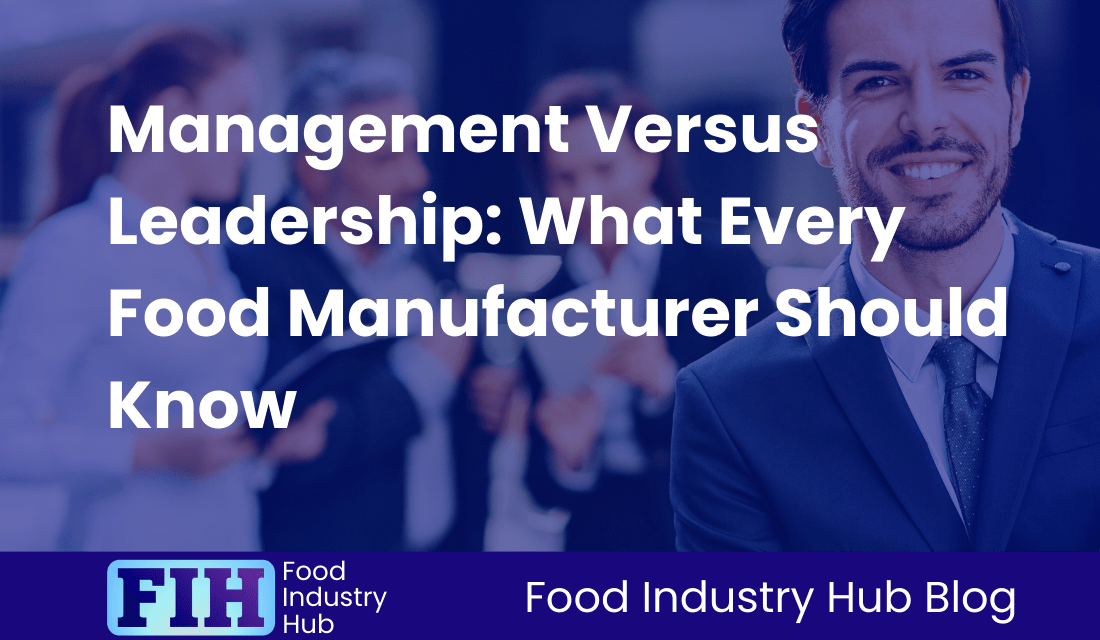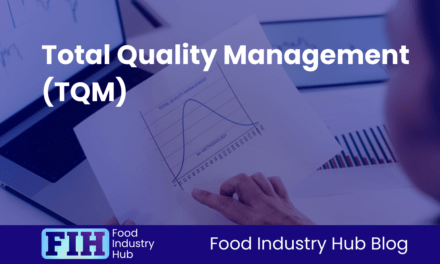Introduction
What exactly sets management apart from leadership? How can you leverage both to steer your organisation towards growth and innovation?
In this post, we’ll look at the characteristics of management versus leadership, and how the two skills compliment each other for an effective and engaged organisational culture.
Table of Contents
Key Takeaways
- Management and leadership are both essential for the success of a food manufacturer.
- Managers focus on efficiency and stability, while leaders prioritise long-term goals and adaptability.
- Managers are responsible for setting goals and organising resources, while leaders inspire and guide employees towards those goals.
- Both managers and leaders need a combination of skills, such as problem-solving and communication, to effectively fulfil their roles.

Food Industry Hub Management Systems simplifies food safety and quality compliance, elevating systematic capability throughout your processes.
Defining Management and Leadership
Management refers to the process of coordinating and overseeing the activities of a group of people to achieve a specific goal or objective. It involves planning, organising, and controlling resources to ensure efficiency and productivity. Managers are responsible for making decisions, allocating resources, and ensuring that tasks are completed on time and within budget. They focus on maintaining stability, following established procedures, and achieving predetermined targets.
Leadership is the ability to inspire and motivate others to achieve a common vision. Leaders set the direction, align people towards shared goals, and empower them to reach their full potential. They provide guidance, support, and encouragement to their team members, fostering a positive and collaborative work environment. Leaders are adaptable, innovative, and forward-thinking, constantly seeking opportunities for growth and improvement. They encourage creativity, initiative, and risk-taking, recognising that these qualities are essential for staying competitive.

Key Differences Between Management and Leadership
There are several key distinctions between management and leadership in the context of food manufacturing.
While management focuses on the day-to-day operations and ensuring tasks are completed efficiently, leadership is about inspiring and motivating employees towards a common goal.
One key difference is the way decisions are made. Managers tend to make decisions based on data and analysis, using a logical and systematic approach. They rely on established processes and procedures to guide their decision-making. On the other hand, leaders often make decisions based on intuition and experience. They trust their instincts and are more willing to take risks, seeking innovative solutions to problems.
Another difference lies in the way each role influences employees. Managers typically have formal authority and use their position to direct and control their teams. They establish clear expectations and hold employees accountable for their performance. Leaders, on the other hand, inspire and motivate their teams through their vision and charisma. They lead by example and encourage employees to go above and beyond their assigned tasks.
Lastly, managers focus on short-term goals and objectives, ensuring that tasks are completed on time and within budget. They prioritise efficiency and productivity. In contrast, leaders have a long-term perspective and focus on the bigger picture. They set the vision and strategic direction for the organisation, inspiring employees to work towards a shared future.

Sign-up for the Food Industry Hub Mail Service
We regularly produce new content for food industry professionals, and the Food Industry Hub Mail Service is the best way to stay up to date with the latest additions.
Signup today to be added to the Food Industry Hub mailing list.
The Importance of Management Skills in Food Manufacturing
Effective management skills are crucial in the food manufacturing industry for ensuring smooth operations and achieving organisational goals. As a food manufacturer, you rely on your management team to oversee every aspect of the production process, from sourcing ingredients to delivering the final product to customers. Without effective management skills, your operations can suffer from inefficiencies, delays, and even safety issues.
One of the key management skills needed in food manufacturing is effective communication. Managers must be able to clearly convey expectations, instructions, and deadlines to their teams. This ensures that everyone is on the same page and working towards the same goals. Effective communication allows managers to address any concerns or issues that may arise in a timely manner, preventing them from escalating into larger problems.
Another important management skill in food manufacturing is problem-solving. In this industry, unexpected challenges can arise, such as equipment breakdowns or ingredient shortages. Managers must be able to quickly assess the situation, come up with viable solutions, and implement them effectively. This requires critical thinking, creativity, and the ability to make informed decisions under pressure.
Effective management skills in food manufacturing also include planning and organisation. Managers must be able to develop and implement efficient production schedules, allocate resources effectively, and ensure that all necessary tasks are completed on time. This requires strong organisational skills, attention to detail, and the ability to prioritise tasks effectively.
In effect, managers must be fluent in the skills needed to organise, oversee, and implement the operational processes of the business.

The Role of Leadership in Driving Innovation
As a leader, you have the power to inspire and motivate your team to think creatively, explore new ideas, and push the boundaries of what’s possible. By fostering a culture of innovation, quality, and safety, you can encourage your employees to take risks, experiment with new processes, and develop innovative products that meet the ever-changing needs of customers and consumers.
A manager generally exerts management authority as an expression of the managerial position they occupy – while a leader can perform a leadership role independently of the hierarchical position they hold.
One of the key ways in which leadership drives cultural values such as innovation and quality is by setting a clear vision and goals for the organisation. By articulating a compelling vision for the future, you can inspire your team to think beyond the status quo and strive for breakthrough ideas and methods. As a leader, you have the responsibility to create an environment where excellence is valued and rewarded. This can be achieved by providing resources, support, and recognition for those who generate innovative solutions.
Effective leaders understand the importance of collaboration and cross-functional teamwork in driving progress. By encouraging a culture of collaboration, you can bring together diverse perspectives and expertise, which can lead to more innovative solutions. By encouraging open communication and creating opportunities for knowledge sharing, you can facilitate the exchange of ideas and promote a culture of continuous learning.
Remember that leadership plays a foundational role in shaping the values and attitudes seen throughout the business. Leadership sets the tone for food safety and quality ideals as well as for operational effectiveness and commercial innovation – so effective leadership will have a defining impact on the food safety and quality culture as well as the commercial positioning of the business.

Developing a Balanced Approach: Integrating Management and Leadership
To effectively drive success in food manufacturing, it’s essential to develop a balanced approach that integrates both management and leadership practices. While management focuses on the day-to-day operations and promotes efficiency, leadership plays a crucial role in guiding the organisation towards its long-term vision and fostering values such as food safety and quality ideals and commercial innovation. By combining the strengths of both management and leadership, food manufacturers can create an effective and resilient environment which provides employees with both structure and inspiration.
Integrating management and leadership requires a shift in mindset and a willingness to embrace change. It involves empowering employees to take ownership of their work, fostering a culture of accountability, and encouraging collaboration across different departments. Transparency and effective communication is key to aligning the organisation’s goals and ensuring everyone is working towards a common purpose.
A balanced approach means recognising that both management and leadership are essential for success. While management focuses on processes, systems, and problem-solving, leadership inspires and motivates employees, sets a clear direction, and sets the tone for the food safety and quality culture (along with other organisational values and ideals). It’s a delicate dance between the two, where managers provide structure and guidance, while leaders inspire and drive change.
Neither management nor leadership is better or superior than the other. A combination of leadership and competent management are needed for the deployment of effective operational processes, targeted toward the strategic vision for the company. A really inspirational and engaging leader may not necessarily make an effective manager, and the same rings true in reverse.

In Summary
In food manufacturing, it’s crucial for companies to strike a balance between effective management and inspiring leadership.
Like the perfect recipe, these two elements must be combined to create success. Management provides the structure and organisation, while leadership drives innovation and motivates employees to reach new heights.

Further Resources
Food Industry Hub serves the food industry with a range of digital resources for the benefit of both commercial food manufacturers and food industry professionals.
For food manufacturers, we offer integrated management systems that give every user a direct interface with your QMS.
For food industry professionals, we provide an extensive signposting service in addition to informational content we hope you’ll find useful as you face new professional challenges. We have very ambitious plans to expand the range of services offered, and currently present informational content on management, safety and quality, food safety and quality culture, and professional success.














